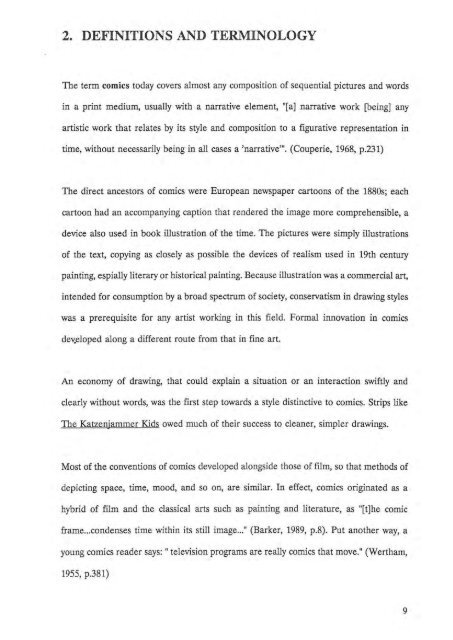Text - Rhodes University
Text - Rhodes University
Text - Rhodes University
Create successful ePaper yourself
Turn your PDF publications into a flip-book with our unique Google optimized e-Paper software.
2. DEFINITIONS AND TERMINOLOGY<br />
The term comics today covers almost any composition of sequential pictures and words<br />
in a print medium, usually with a narrative element, "[a] narrative work [being] any<br />
artistic work that relates by its style and composition to a figurative representation in<br />
time, without necessarily being in all cases a 'narrative'''. (Couperie, 1968, p.231)<br />
The direct ancestors of comics were European newspaper cartoons of the 1880s; each<br />
cartoon had an accompanying caption that rendered the image more comprehensible, a<br />
device also used in book illustration of the time. The pictures were simply illustrations<br />
of the text, copying as closely as possible the devices of realism used in 19th century<br />
painting, espially literary or historical painting. Because illustration was a commercial art,<br />
intended for consumption by a broad spectrum of society, conservatism in drawing styles<br />
was a prerequisite for any artist working in this field. Formal innovation in comics<br />
dev.eloped along a different route from that in fine art.<br />
An economy of drawing, that could explain a situation or an interaction swiftly and<br />
clearly without words, was the first step towards a style distinctive to comics. Strips like<br />
The Katzenjammer Kids owed much of their success to cleaner, simpler drawings.<br />
Most of the conventions of comics developed alongside those of film, so that methods of<br />
depicting space, time, mood, and so on, are similar. In effect, comics originated as a<br />
hybrid of film and the classical arts such as painting and literature, as "[t]he comic<br />
frame ... condenses time within its still image ..." (Barker, 1989, p.8). Put another way, a<br />
young comics reader says: " television programs are really comics that move." (Werth am,<br />
1955, p.381)<br />
9
















